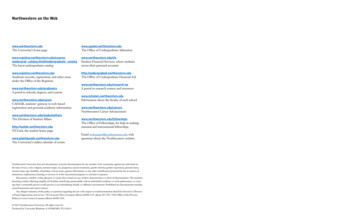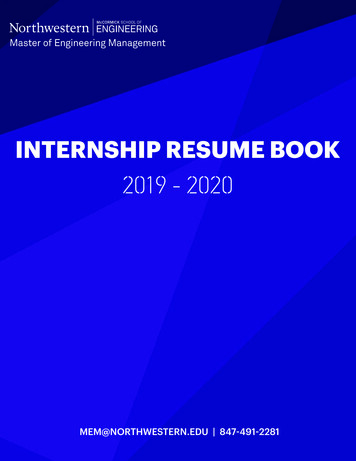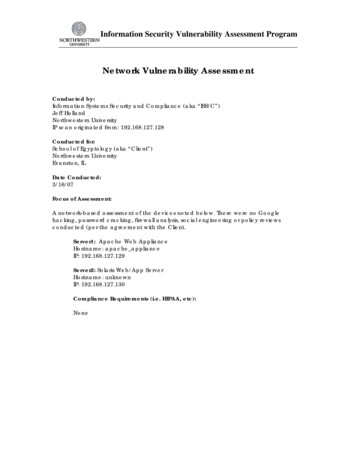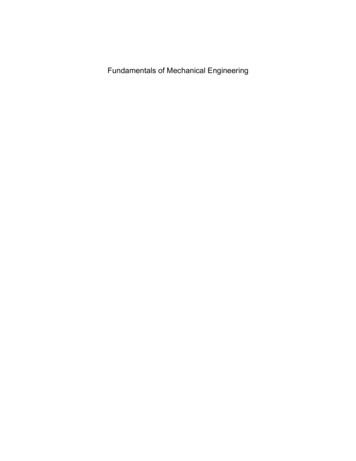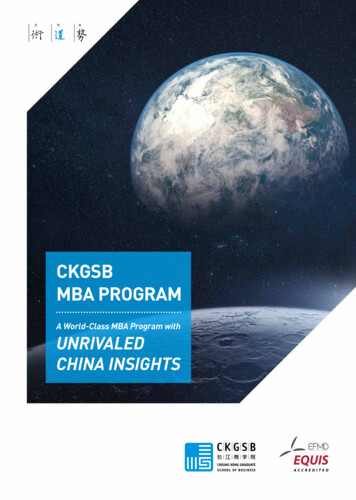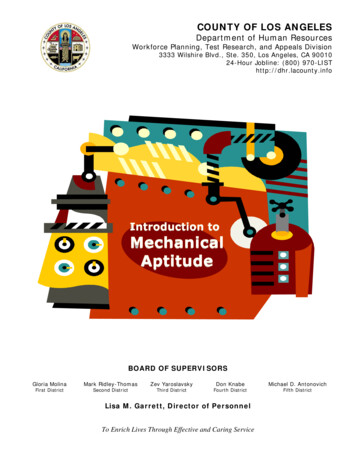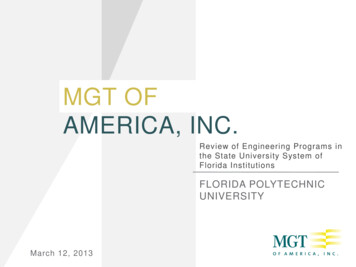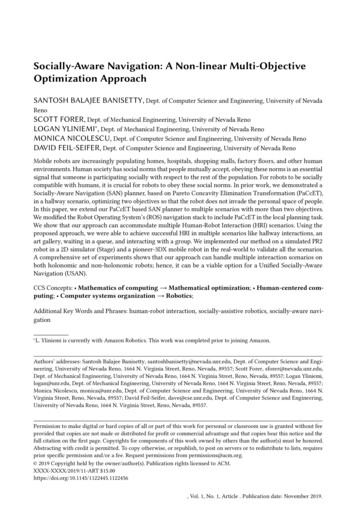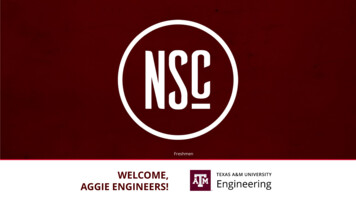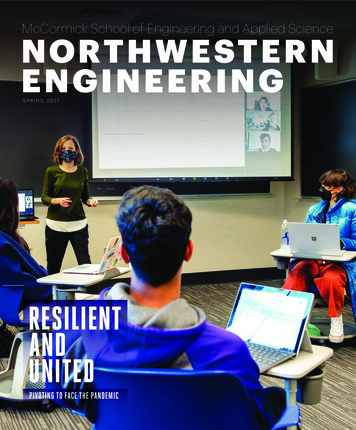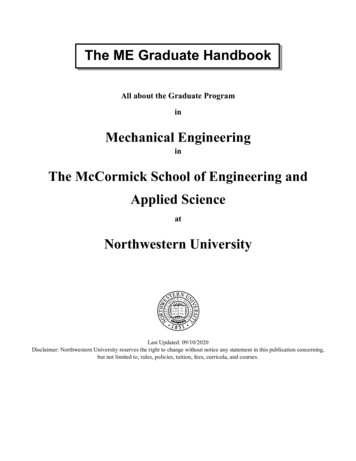
Transcription
The ME Graduate HandbookAll about the Graduate PrograminMechanical EngineeringinThe McCormick School of Engineering andApplied ScienceatNorthwestern UniversityLast Updated: 09/10/2020Disclaimer: Northwestern University reserves the right to change without notice any statement in this publication concerning,but not limited to, rules, policies, tuition, fees, curricula, and courses.
Table of ContentsMechanical Engineering at Northwestern University . 5COVID-19 Information and Resources . 6Nondiscrimination Statement . 6The Graduate Program in Mechanical Engineering . 7Graduate Program Goals/Mission Statement . 7MS Program Learning Objectives, Milestones, and Assessment. 7PhD Program Learning Objectives, Milestones, and Assessment . 8MS Degree Requirements . 101. Thesis Option . 10Course Requirements . 10Research . 11GPA Requirement . 11Master’s Thesis and Examination . 11MS Thesis . 11Transferring from MS to PhD . 112. Non-thesis Option for Terminal MS Degree. 12Course Requirements . 12Project . 13GPA Requirement . 13Master’s Completion . 13PhD Degree Requirements . 15Course Requirements . 15Teaching Experience . 15Proposal Writing Experience. 15English Requirements . 15Qualifying Examination/Admission to Candidacy/PhD Prospectus . 16Research Qualification Exam . 16Dissertation Proposal Exam . 16GPA Requirement . 16PhD Thesis Dissertation . 17Final Examination/Dissertation Defense . 17PhD Student Assessment and Feedback . 17ME Sub-Areas– Course Information . 18Design/Manufacturing/Tribology . 18Faculty Research Interests . 18Course Work . 181
Contact . 19Dynamics, Control, Robotics, and Neural Engineering. 20Faculty Research Interests . 20Course Work . 20Contact . 21Solid Mechanics . 22Faculty Research Interests . 22Course Work . 22Contact . 23Fluid Mechanics and Energy . 24Faculty Research Interests . 24Course Work . 24Contact . 25Nanotechnology/MEMS . 26Faculty Research Interests . 26Course Work . 26Contact . 27Other Important Graduate Study Information . 28Course Levels . 28Grades . 28Financial Aid, Fellowships, and Registration. 28Registration as a Full-Time Student . 28Continuous Registration Requirement . 29Where and When to Register. 29Finding an Advisor . 30Student Wellness, Conflict Resolution and Changing an Advisor . 30PhD Advisory Committee Guidelines . 30Academic and Research Integrity. 30Family Leave Policy. 30Summer Internship . 31Conference Travel Grant . 31New Computer Initiative . 31Academic Probation . 31Exclusion (Dismissal) and Appeals Process. 31Mechanical Engineering Department Information. 32Support Staff . 32Photocopier/Scanner. 322
Fax Machine . 32Paychecks . 32Eligibility to Work in the U.S. . 32Mailboxes . 32Phones . 32Emergency. 33E-Mail . 33Purchasing . 33Travel Reimbursement . 33Mechanical Engineering Department Facilities . 33Mechanical Engineering Faculty and Their Research. 34Around Northwestern University . 41Norris Center Bookstore. 41Bursar’s Office . 41Campus Parking Office . 41Campus Police Department . 41University Career Advancement . 41Counseling and Psychological Services (CAPS). 41Ryan Field and McGaw Hall . 41ID Cards . 41Math Library . 41Norris University Center . 41Off-Campus Housing Office . 41Patten Gym . 41Seeley G. Mudd Library . 41Sports and Aquatic Center (SPAC) . 42Student Health Center . 42Student Loans Office . 42TGS Commons . 42University Library . 42Dining Options . 42Evanston Information . 42Evanston Police/Fire . 42Housing (On-and Off-Campus) . 42Transportation . 43Public . 43CTA (Chicago Transit Authority) . 433
Amtrak . 44Greyhound . 44NU Shuttles . 44Getting to O’Hare and Midway Airports. 44Rental Cars . 44Divvy Bikeshare . 44Parking on Campus . 44Parking in the City of Evanston . 444
Information about the Graduate Program inMechanical EngineeringMcCormick School of Engineering and Applied ScienceNorthwestern UniversityMECHANICAL ENGINEERING AT NORTHWESTERN UNIVERSITYNorthwestern University’s Department of Mechanical Engineering is a leader in fundamental research in several cutting-edgetechnologies that are relevant to today’s society. Our programs provide a solid foundation for careers in academia, industry andresearch labs. Northwestern’s tradition of interdisciplinary research provides students with exciting new opportunities in thebroad areas of: Design, Manufacturing and Tribology Dynamics, Control, Robotics, and Neural Engineering Fluid Mechanics and Energy Nanotechnology and MEMS Solid Mechanicswith new emphases in: Design Biosystems and Health Nano/Microscience and Technology Energy and Sustainability Data-Driven Multiscale Simulation in Science and EngineeringYou will find updated information about the current research activities of the department on our anical/.5
COVID-19 INFORMATION AND RESOURCESIn the 2020-2021 academic year, many aspects of the graduate program, including classes and research in the MechanicalEngineering department, are affected by the COVID-19 pandemic. Because the situation is constantly changing, students areencouraged to consult the COVID-19 and Campus Updates web site for full and latest us-covid-19-updates/In Fall 2020, all Mechanical Engineering courses will be taught either fully online (synchronously or asynchronously), or in ahybrid mode (online, but with some in-person sessions). In both cases, students will be able to take all courses fully remotely.Current plans can be found on the department Course Listings web ical/academics/courses/NONDISCRIMINATION STATEMENTNorthwestern University does not discriminate or permit discrimination by any member of its community against any individualon the basis of race, color, religion, national origin, sex, pregnancy, sexual orientation, gender identity, gender expression,parental status, marital status, age, disability, citizenship status, veteran status, genetic information, reproductive health decisionmaking, or any other classification protected by law in matters of admissions, employment, housing, or services or in theeducational programs or activities it operates. Harassment, whether verbal, physical, or visual, that is based on any of thesecharacteristics is a form of discrimination. Further prohibited by law is discrimination against any employee and/or jobapplicant who chooses to inquire about, discuss, or disclose their own compensation or the compensation of another employeeor applicant.Northwestern University complies with federal and state laws that prohibit discrimination based on the protected categorieslisted above, including Title IX of the Education Amendments of 1972. Title IX requires educational institutions, such asNorthwestern, to prohibit discrimination based on sex (including sexual harassment) in the University’s educational programsand activities, including in matters of employment and admissions. In addition, Northwestern provides reasonableaccommodations to qualified applicants, students, and employees with disabilities and to individuals who are pregnant.Any alleged violations of this policy or questions with respect to nondiscrimination or reasonable accommodations should bedirected to Northwestern’s Office of Equity, 1800 Sherman Avenue, Suite 4-500, Evanston, Illinois 60208, 847-467-6165,equity@northwestern.edu.Questions specific to sex discrimination (including sexual misconduct and sexual harassment) should be directed toNorthwestern’s Title IX Coordinator in the Office of Equity, 1800 Sherman Avenue, Suite 4-500, Evanston, Illinois 60208,847-467-6165, TitleIXCoordinator@northwestern.edu.A person may also file a complaint with the Department of Education’s Office for Civil Rights regarding an alleged violationof Title IX by visiting html or calling 800-421-3481. Inquiries about theapplication of Title IX to Northwestern may be referred to Northwestern’s Title IX Coordinator, the United States Departmentof Education’s Assistant Secretary for Civil Rights, or both.6
THE GRADUATE PROGRAM IN MECHANICAL ENGINEERINGThe Department of Mechanical Engineering offers programs leading to the MS and PhD degrees. Outstanding students may beadmitted for graduate study directly from the bachelor's to the doctoral degree.Students arrange their study and research in association with individual faculty members and often with the variousinterdepartmental and special programs associated with the Center for Surface Engineering and Tribology, the Center for SmartStructures and Materials, the Center for Robotics and Biosystems, Northwestern Institute on Complex Systems, the SegalDesign Institute, Northwestern Initiative for Manufacturing Science and Innovation (NIMSI), the Program in Theoretical andApplied Mechanics, and the Predictive Science & Engineering Design (PS&ED) Cluster.Graduate students are not required to follow a rigid curriculum; each student may arrange a curriculum that accommodatesindividual needs, talents, and interests while satisfying the basic degree requirements. The basic degree requirements aredesigned to ensure that the students develop a rigorous appreciation of mathematics, and have a broad exposure to fields ofengineering and science outside of their immediate area of interest.Graduate Program Goals/Mission Statement:The graduate program in mechanical engineering aims to discover new knowledge and technologies, and train mechanicalengineers that will shape our future. We strive to transform students to outstanding scholars, teachers and engineeringprofessionals who will become the future leaders in science and engineering. Our graduate curriculum aims to enable studentsto learn the fundamentals of mechanical engineering by focusing on core disciplines in mechanics, manufacturing, and systems,together with essential areas of mathematics and physical sciences. Teaching and research experiences promote personal andprofessional growth while developing technical aptitude, while gaining creative thinking and communication skills that arenecessary for crafting a better future.The learning objectives and assessment strategies followed by our department for our graduate programs are listed below:MS Program Learning Objectives, Milestones, and AssessmentLearning objective(s)Students should be able to Milestone/Requirement/CapacityAssessment Strategies and Criteria*How do we know this objective has been achieved?What criteria do we have to measure success?Make original researchcontributions to science,engineering and technologymanagement fields.Research ProjectPlanning andExecutionAssessment Strategy: Advisor evaluates planned researchproject, provides feedback for improvement.Criteria: Formulate a research plan with propermethodology, write an original thesis or project report,and as feasible publish research progress in journals orfile patents/IP.Demonstrate command overbasic knowledge in the fieldand effective scholarlycommunication skills.MS Thesis Defense orMS Research ProjectReportAssessment Strategy: Thesis committee (or the advisorfor research project) review of student’s basic knowledgein the field, research skills, and presentation skills.Criteria: A research presentation summarizing keyaccomplishments.Establish a career planSemi-Annual Meetingfor MS ThesisCandidatesStudent shares plan semi-annually with advisor at semiannual progress review and individual meetings; studentand advisor craft a plan for appropriate training andidentify necessary resources for post-graduate success.Enact ethical researchmethodologies and practices.RCR Training/ResearchCriteria: Fosters ethical problem-solving skills; increasethe ability to recognize ethical issues in design andconduct of research; identify and understand clinicalethics regulations, policies, and resources.7
PhD Program Learning Objectives, Milestones, and AssessmentLearning objective(s)Students should be able to Milestone/Requirement/CapacityAssessment Strategies and Criteria*How do we know this objective has been achieved?What criteria do we have to measure success?Make original researchcontributions to science,engineering and technologymanagement fields.Thesis ssessment Strategy: Committee evaluates thesisdefense, provides feedback for improvement.Criteria: Formulate a research plan with propermethodology, write an original thesis, publish researchprogress in journals or file patents/IP.Demonstrate command overbasic knowledge in the fieldand effective scholarlycommunication skills.ResearchQualificationExamAssessment Strategy: Committee review of student’sbasic knowledge in the field, research skills, presentationskills.Criteria: A research presentation summarizing keyaccomplishments from the first year and a half.Design a classroom activity andgain teaching experienceTA fulfilled /other teachingexperienceAssessment Strategy: Course instructor evaluatesoutcomes, students provide formative assessment (e.g.CTECs, surveys). Designed classwork or homeworkserves as a summative assessment that measuresstudents’ success in acquiring the new skills andknowledge.Establish a career planAnnual MeetingStudent shares plan annually with advisor at annualprogress review and individual meetings; student andadvisor craft a plan for appropriate training and identifynecessary resources for post-graduate success.Enact ethical researchmethodologies and practices.RCR Training/ResearchCriteria: Fosters ethical problem-solving skills; increasethe ability to recognize ethical issues in design andconduct of research; identify and understand clinicalethics regulations, policies, and resources.8
MS PROGRAM INFORMATION(The following pages, 10-13, are applicable for the MS degree)9
MS DEGREE REQUIREMENTS:TGS minimum course requirements: TGS policy requires, as a minimum for master’s degrees: Nine quality letter-graded(ABC, not P/NP) courses approved for TGS credit (i.e., courses with a career of TGS, as designated in CAESAR). Full-timeregistration requires enrollment in a combination of course units and ME 590 (research) units for a total of 3 or more units eachquarter. The ME graduate program has further course requirements for MS degrees as detailed below.1 Thesis optionCourse Requirements: Number of courses: Nine course units are required, excluding ME 590 research units. (12 total units) General program breadth requirement: General program students must take at least one course each from four ofthe eight subareas:(1) Solids, (2) Fluids/Thermodynamics/Energy, (3) Robotics/Dynamics/Controls,(4) Design/Manufacturing/Tribology, (5) MEMS/Nanotechnology, (6) Biomedical/Biology,(7) Mathematics/Scie
Sep 10, 2020 · The ME Graduate Handbook. All about the Graduate Program. in. Mechanical Engineering. in. The McCormick School of Engineering and . Applied Science. at. . to learn the fundamentals of mechanical engineering by focusing on core disciplines i
